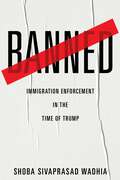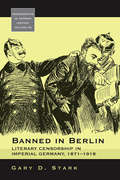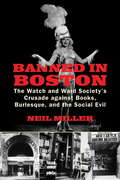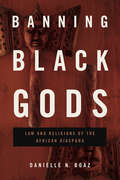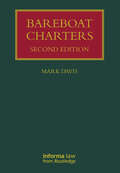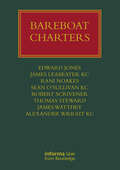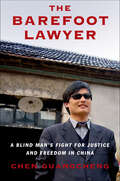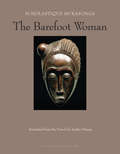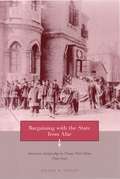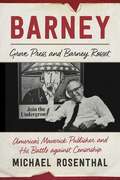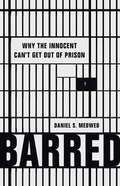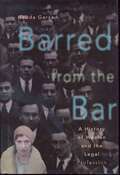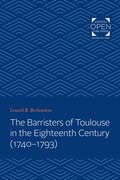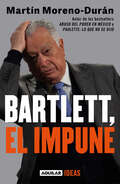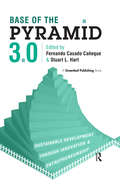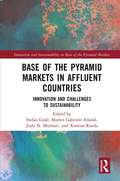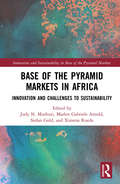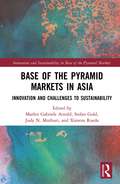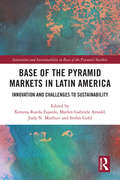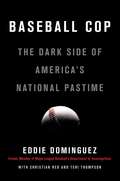- Table View
- List View
Banned: Immigration Enforcement in the Time of Trump
by Shoba Sivaprasad WadhiaWinner, 2020 Best Book Award, Law Category, given by the American Book FestExamines immigration enforcement and discretion during the first eighteen months of the Trump administrationWithin days of taking office, President Donald J. Trump published or announced changes to immigration law and policy. These changes have profoundly shaken the lives and well-being of immigrants and their families, many of whom have been here for decades, and affected the work of the attorneys and advocates who represent or are themselves part of the immigrant community. Banned examines the tool of discretion, or the choice a government has to protect, detain, or deport immigrants, and describes how the Trump administration has wielded this tool in creating and executing its immigration policy.Banned combines personal interviews, immigration law, policy analysis, and case studies to answer the following questions: (1) what does immigration enforcement and discretion look like in the time of Trump? (2) who is affected by changes to immigration enforcement and discretion?; (3) how have individuals and families affected by immigration enforcement under President Trump changed their own perceptions about the future?; and (4) how do those informed about immigration enforcement and discretion describe the current state of affairs and perceive the future? Shoba Sivaprasad Wadhia pairs the contents of these interviews with a robust analysis of immigration enforcement and discretion during the first eighteen months of the Trump administration and offers recommendations for moving forward.The story of immigration and the role immigrants play in the United States is significant. The government has the tools to treat those seeking admission, refuge, or opportunity in the United States humanely. Banned offers a passionate reminder of the responsibility we all have to protect America’s identity as a nation of immigrants.
Banned In Berlin
by Gary D. StarkImperial Germany's governing elite frequently sought to censor literature that threatened established political, social, religious, and moral norms in the name of public peace, order, and security. It claimed and exercised a prerogative to intervene in literary life that was broader than that of its Western neighbors, but still not broad enough to prevent the literary community from challenging and subverting many of the social norms the state was most determined to defend. This study is the first systematic analysis in any language of state censorship of literature and theater in imperial Germany (1871-1918). To assess the role that formal state controls played in German literary and political life during this period, it examines the intent, function, contested legal basis, institutions, and everyday operations of literary censorship as well as its effectiveness and its impact on authors, publishers, and theater directors.
Banned in Boston
by Neil Miller"I want to be intelligent, even if I do live in Boston."--an anonymous Bostonian, 1929 In this spectacular romp through the Puritan City, Neil Miller relates the scintillating story of how a powerful band of Brahmin moral crusaders helped make Boston the most straitlaced city in America, forever linked with the infamous catchphrase "Banned in Boston." Bankrolled by society's upper crust, the New England Watch and Ward Society acted as a quasi-vigilante police force and notorious literary censor for over eighty years. Often going over the heads of local authorities, it orchestrated the mass censorship of books and plays, raided gambling dens and brothels, and utilized spies to entrap prostitutes and their patrons. Miller deftly traces the growth of the Watch and Ward, from its formation in 1878 to its waning days in the 1950s. During its heyday, the society and its imitators banished modern classics by Hemingway, Faulkner, and Sinclair Lewis and went to war with publishing and literary giants such as Alfred A. Knopf and The Atlantic Monthly. To the chagrin of the Watch and Ward, some writers rode the national wave of publicity that accompanied the banning of their books. Upton Sinclair declared staunchly, "I would rather be banned in Boston than read anywhere else because when you are banned in Boston, you are read everywhere else." Others faced extinction or tried to barter their way onto bookshelves, like Walt Whitman, who hesitantly removed lines from Leaves of Grass under the watchful eye of the Watch and Ward. As the Great Depression unfolded, the society shifted its focus from bookstores to burlesque, successfully shuttering the Old Howard, the city's legendary theater that attracted patrons from T. S. Eliot to John F. Kennedy. Banned in Boston is a lively history and, despite Boston's "liberal" reputation today, a cautionary tale of the dangers caused by moral crusaders of all stripes.
Banning Black Gods: Law and Religions of the African Disapora (Africana Religions #6)
by Danielle N. BoazBanning Black Gods is a global examination of the legal challenges faced by adherents of the most widely practiced African-derived religions in the twenty-first century, including Santeria/Lucumi, Haitian Vodou, Candomblé, Palo Mayombe, Umbanda, Islam, Rastafari, Obeah, and Voodoo. Examining court cases, laws, human rights reports, and related materials, Danielle N. Boaz argues that restrictions on African diaspora religious freedom constitute a unique and pervasive form of anti-Black discrimination.Emphasizing that these twenty-first-century cases and controversies are not a new phenomenon but rather a reemergence of colonial-era ideologies and patterns of racially motivated persecution, Boaz focuses each chapter on a particular challenge to Black religious freedom. She examines issues such as violence against devotees, restrictions on the ritual slaughter of animals, limitations on the custodial rights of parents, and judicial refusals to recognize these faiths as protected religions. Boaz introduces new issues that have never been considered as a question of religious freedom before—such as the right of Palo Mayombe devotees to possess remains of the dead—and she brings together controversies that have not been previously regarded as analogous, such as the right to wear headscarves and the right to wear dreadlocks in schools. Framing these issues in comparative perspective and focusing on transnational and transregional issues, Boaz advances our understanding of the larger human rights disputes that country-specific studies can overlook.Original and compelling, this important new book will be welcomed by students and scholars of African diaspora religions and discerning readers interested in learning more about the history of racial discrimination
Banning Black Gods: Law and Religions of the African Diaspora (Africana Religions)
by Danielle N. BoazBanning Black Gods is a global examination of the legal challenges faced by adherents of the most widely practiced African-derived religions in the twenty-first century, including Santeria/Lucumi, Haitian Vodou, Candomblé, Palo Mayombe, Umbanda, Islam, Rastafari, Obeah, and Voodoo. Examining court cases, laws, human rights reports, and related materials, Danielle N. Boaz argues that restrictions on African diaspora religious freedom constitute a unique and pervasive form of anti-Black discrimination.Emphasizing that these twenty-first-century cases and controversies are not a new phenomenon but rather a reemergence of colonial-era ideologies and patterns of racially motivated persecution, Boaz focuses each chapter on a particular challenge to Black religious freedom. She examines issues such as violence against devotees, restrictions on the ritual slaughter of animals, limitations on the custodial rights of parents, and judicial refusals to recognize these faiths as protected religions. Boaz introduces new issues that have never been considered as a question of religious freedom before—such as the right of Palo Mayombe devotees to possess remains of the dead—and she brings together controversies that have not been previously regarded as analogous, such as the right to wear headscarves and the right to wear dreadlocks in schools. Framing these issues in comparative perspective and focusing on transnational and transregional issues, Boaz advances our understanding of the larger human rights disputes that country-specific studies can overlook.Original and compelling, this important new book will be welcomed by students and scholars of African diaspora religions and discerning readers interested in learning more about the history of racial discrimination
Bar Exam Mind: A Strategy Guide for an Anxiety-Free Bar Exam
by Matt RacineThe goal of this book is to teach techniques and strategies to create a Bar Exam Mind and thereby reduce stress and achieve peak learning and performance.
Barbara Wootton and the Legacy of a Pioneering Public Criminologist (Routledge Key Thinkers in Criminology)
by Philip BeanThis book offers an assessment of Barbara Wootton’s legacy as a pioneering public criminologist. Barbara Wootton (1897-1988) was a leading British social scientist, magistrate, academic and public servant. She was also a life peer (Baroness Wootton of Abinger) and the first woman to sit on the Woolsack in the House of Lords as Deputy Speaker. One of the Royal Commissions on which she served was on the Penal System, (1964) and two of the Departmental Committees were on the Business of the Criminal Courts (1958) and Criminal Statistics (1963). Of her written work perhaps the most famous is `Social Science and Social Pathology` (published in 1959) which was an attempt to discover what the social sciences had to say about criminality, its causes and its social effects. This book examines her career in historical context, and her contribution to thinking and scholarship on a range of topics. These topics range from the courts and the penal system and her report on the Community Service Order, to crime and criminal law and her analysis of the notions of mens rea, to her work on psychiatry and criminal justice. It explores her contribution as a utilitarian critic in Criminology, within the British empiricist tradition. Written in a clear and direct style, this book will appeal to students and scholars of criminology, sociology, criminal justice, law and all those interested in learning more about Barbara’s life and times.
BARBRI Comprehensive Review Virginia
by Barbri A Thomson ReutersBarbri Comprehensive Review Virginia
Bareboat Charters (Lloyd's Shipping Law Library)
by Mark DavisThis book examines for the first time the Barecon 2001 form which was adopted by the Documentary Committee of BIMCO in November 2001. The title explains the nature and formation of a bareboat charter, and examines and comments upon each of the clauses contained in the new form, drawing comparisons with the Barecon 89 form. It gives separate consideration to the form and the issues that arise in the context of finance charters and leases. It also provides valuable guidance upon the admiralty and arrest jurisdiction of the English court in relation to bareboat charters. The second edition has been thoroughly revised and updated, with extended commentary on the issues arising in the context of bareboat charters regarding insolvency, insurance and the provisions for new buildings.
Bareboat Charters (Lloyd's Shipping Law Library)
by Edward Jones James Leabeater KC Rani Noakes Sean O'Sullivan KC Robert Scrivener Thomas Steward James Watthey Alexander Wright KCThis book examines and explains the law relevant to bareboat or demise charterparties, a common form of maritime contract used by both operators of vessels and also as a form of lease finance. Its principal aim is to set out a structured analysis of all the rights and obligations of the parties to a bareboat charter. This will include consideration of the nature of the contract, its uses (both historical and current) in the market, and the key clauses in the standard form and commentary thereon.Providing a clause-by-clause analysis commentary on all the provisions of the BIMCO BARECON, and all decisions relevant to those clauses, Bareboat Charters addresses important topics such as termination, repossession and damages from an English law standpoint, adding useful guidance for practitioners. It considers general issues of contract and/or maritime law so far as they relate to bareboat charters, and extracts or summarises key passages of important case law.This book will serve as the standard reference work on the law relating to bareboat charters, providing comprehensive treatment of the subject, accessible and useful to shipping lawyers and also to shipowners, charterers, P&I Clubs, and other insurers.
The Barefoot Lawyer: A Blind Man's Fight for Justice and Freedom in China
by Chen GuangchengAn electrifying memoir by the blind Chinese activist who inspired millions with the story of his fight for justice and his belief in the cause of freedomIt was like a scene out of a thriller: one morning in April 2012, China's most famous political activist—a blind, self-taught lawyer—climbed over the wall of his heavily guarded home and escaped. Days later, he turned up at the American embassy in Beijing, and only a furious round of high-level negotiations made it possible for him to leave China and begin a new life in the United States.Chen Guangcheng is a unique figure on the world stage, but his story is even more remarkable than anyone knew. The son of a poor farmer in rural China, blinded by illness when he was an infant, Chen was fortunate to survive a difficult childhood. But despite his disability, he was determined to educate himself and fight for the rights of his country's poor, especially a legion of women who had endured forced sterilizations and abortions under the hated "one child" policy. Repeatedly harassed, beaten, and imprisoned by Chinese authorities, Chen was ultimately placed under house arrest. After nearly two years of increasing danger, he evaded his captors and fled to freedom.Both a riveting memoir and a revealing portrait of modern China, The Barefoot Lawyer tells the story of a man who has never accepted limits and always believed in the power of the human spirit to overcome any obstacle.
The Barefoot Woman
by Scholastique MukasongaA moving, unforgettable tribute to a Tutsi woman who did everything to protect her children from the Rwandan genocide, by the daughter who refuses to let her family's story be forgotten.The story of the author's mother, a fierce, loving woman who for years protected her family from the violence encroaching upon them in pre-genocide Rwanda. Recording her memories of their life together in spare, wrenching prose, Mukasonga preserves her mother's voice in a haunting work of art.
Bargaining with the State from Afar: American Citizenship in Treaty Port China, 1844-1942
by Eileen ScullyIn the early 1990s, when organizations representing the 2.6 million U.S. nationals living abroad appealed to Congress for their own non-voting representative, the response of one Senator was to dismiss these "moans of the mink-swathed Americans abroad." However, the image of a life of luxury abroad is usually a harsher reality complicated by income taxes, military duty, and legal jurisdiction. What exactly is the obligation of a state toward citizens who live outside its borders? Bargaining with the State from Afar traces the relationship between the United States federal government and sojourning Americans living in the colonial enclaves of pre-World War II China. This group of Americans was not subject to Chinese law, but rather to an amalgam of laws borrowed from the District of Columbia and other territorial codes, as well as to local ordinances enacted by foreigners themselves. Scully explores U.S. government efforts to police this anomalous zone in the American policy and places the struggle between federal officials and sojourning U.S. nationals in the larger context of changing international law and modern citizenship regimes.She argues that the American experience with extraterritorial justice in China offers an important new vantage point from which to examine a singular area in the history of modern states. This case study of U.S. consular jurisdiction reveals the legal, political, and cultural process through which modern states have struggled to govern citizens outside their borders. Scully's examination of the U. S. Court for China is one of the first serious analysis of this anomalous institution.
Barney: Grove Press and Barney Rosset: America’s Maverick Publisher and His Battle against Censorship
by Michael RosenthalAn incisive, compulsively readable biography of the man the Guardian called the most influential avant-garde publisher of the twentieth century.An impetuous outsider who delighted in confronting American hypocrisy and prudery, Barney Rosset liberated American culture from the constraints of Puritanism. As the head of Grove Press, he single-handedly broke down the laws against obscenity, changing forever the nature of writing and publishing in this country. He brought to the reading public the European avant-garde, among them Samuel Beckett and Harold Pinter, radical political and literary voices such as Malcolm X, Che Guevara, and Jack Kerouac, steamy Victorian erotica, and banned writers such as D. H. Lawrence, Henry Miller, and William Burroughs. His almost mystical belief in the sacrosanct nature of the First Amendment essentially demarcates the before and after of American publishing.Barney explores how Grove's landmark legal victories freed publishers to print what they wanted, and it traces Grove's central role in the countercultural ferment of the sixties and early seventies. Drawing on the Rosset papers at Columbia University and personal interviews with former Grove Press staff members, friends, and wives, it tells the fascinating story of this feisty, abrasive, visionary, and principled cultural revolutionary—a modern Huckleberry Finn according to Nobel Prize–winning novelist Kenzaburo Oe—who altered the reading habits of a nation.
Barred: Why the Innocent Can't Get Out of Prison
by Daniel S. MedwedA groundbreaking exposé of how our legal system makes it nearly impossible to overturn wrongful convictions Thousands of innocent people are behind bars in the United States. But proving their innocence and winning their release is nearly impossible. In Barred, legal scholar Daniel S. Medwed argues that our justice system&’s stringent procedural rules are largely to blame for the ongoing punishment of the innocent. Those rules guarantee criminal defendants just one opportunity to appeal their convictions directly to a higher court. Afterward, the wrongfully convicted can pursue only a few narrow remedies. Even when there is strong evidence of a miscarriage of justice, rigid guidelines, bias, and deference toward lower courts all too often prevent exoneration. Offering clear explanations of legal procedures alongside heart-wrenching stories of their devastating impact, Barred exposes how the system is stacked against the innocent and makes a powerful call for change.
Barred from the Bar: A History of Women and the Legal Profession (Women Then - Women Now)
by Hedda GarzaThis is an account of women's attempts to become practicing lawyers, gain entrance to law schools, and to obtain the same legal rights as men, such as the right to hold property, etc. This book begins with the American Revolutionary war when women had few legal rights at all and extends to the appointment of the first women to the Supreme Court bench.
The Barristers of Toulouse in the Eighteenth Century (The Johns Hopkins University Studies in Historical and Political Science)
by Lenard BerlansteinOriginally published in 1975. Following the vein of French historiography, many twentieth-century scholars of the French Revolution believed that the middle class of lawyers played a crucial role in the Revolution. In The Barristers of Toulouse, Lenard Berlanstein contends with that notion in a case study examining the response of the Toulousian legal community to the French Revolution. Using tax rolls, marriage contracts, and court records as primary sources, Professor Berlanstein argues that class interests—such as a desire to preserve their status in the cultured, conservative urban elite—led many Toulousian judges and lawyers to reject the Revolution and to remain loyal to the aristocratic Parlement. In other words, those in the legal community of Toulouse conducted themselves in ways that were consistent with other members of their social and economic class. To supplement his argument, Berlanstein's integrates methods from the New Social History movement.
Barron's Real Estate Licensing Exams: Salesperson, Broker, and Appraiser (Barron's Educational Series)
by Jack P. Friedman Bruce Linderman<p>In recent years, legal, social, economic, and financial matters affecting real estate have become more complex, creating greater educational needs for those who are engaged in the real estate business. In today's environment, a salesperson, broker, or appraiser cannot survive solely on a pleasant disposition and a neat appearance. <p>Real estate professionals must be aware of and obey federal, state, and local regulations. They need in-depth knowledge of each property being brokered, including its physical surroundings and its economic, legal, social, and political environment. In recognition of these needs, most states have adopted more stringent standards for the licensure of real estate brokers and salespersons. <p>These standards include more education, more rigorous examinations, or both. Population mobility, the need for licensure reciprocity, increased federal regulation, and greater communication and cooperation between state license law officials have all led to greater uniformity in real estate licensing standards. <p>This study guide and test preparation manual has been updated to provide the latest information in real estate finance, federal law and regulation, and appraisal license requirements. <p> <li>Explains all aspects of real estate law and finance, including contracts, deeds, appraisals, brokerage, leasing, mortgages, federal regulation of Fair Housing, Truth-in-Lending, and environmental matters <li>Presents more than 1,600 practice questions similar to those found on licensing exams, including 9 model tests <li>All questions answered and explained</li> </p>
Bartlett: el impune
by Martín MorenoBartlett, el impune, está armado con entrevistas, documentos reveladores, datos duros amargos, testimonios de personalidades cercanas a Bartlett y confidencias periodísticas. El libro muestra el autoritarismo, complicidades y corruptelas de este político ultranacionalista que, con AMLO, quien lo escucha sumiso y lo obedece, son actores principales de la ruina política y económica que soporta México. Con Bartlett, el impune, Martín Moreno-Durán confirma que es el periodista más punzante del sistema político mexicano: ha señalado, con nombres y hechos, los abusos, el desfalco y la insolencia de los gobiernos corruptos del PRI, del PAN y de Morena. Por primera vez se ofrece en un libro el perfil más amplio de uno de los políticos más siniestros y poderosos del México contemporáneo: Manuel Bartlett Díaz. Priista de línea dura, implicado en el asesinato del agente de la DEA, Enrique Kiki Camarena; verdugo en la penumbra del crimen del célebre periodista Manuel Buendía; hombre clave que impidió el triunfo legítimo de Cuauhtémoc Cárdenas en las oscuras elecciones de 1988 y actualmente el hombre más poderoso del gobierno de AMLO, quizá, aún más potente que el presidente.
Base of the Pyramid 3.0: Sustainable Development through Innovation and Entrepreneurship
by Fernando Casado Caneque Stuart L. HartFor well over 4 billion people – approximately 60% of all humanity – annual income is less than $1,500. The term "Base of the Pyramid" was first coined by Stuart L. Hart and C.K. Prahalad in 2002 and has become synonymous with both the method by which we can more effectively address poverty and the opportunity that exists in a multi-trillion-dollar market. A whole new lexicon has emerged to describe this phenomenon, including new buzzwords and catch phrases like "inclusive business", "opportunities for the majority", "sustainable livelihoods", "pro-poor business" and “social business”, and thousands of new businesses, institutions and investment funds have been set up.In this ground-breaking new book, Stuart L. Hart and Fernando Casado Cañeque have worked with members of the BoP Global Network to shake the tree, look objectively at what has happened since 2002, highlight why earlier applications of BoP haven’t worked and propose new objectives and ways of working to formulate more sustainable solutions. The book challenges the reader and organizations to think about the mindset and purpose across whole organizations, open innovation rather than simply co-creation, and a complete review of the innovation ecosystem. Through this book, practitioners will gain a clearer insight into which business models can work within different communities to ensure a sustainable transition to improved local economies. Equally, the book is a must-read for researchers and students in the fields of entrepreneurship, innovation, sustainable development and environmental management.
Base of the Pyramid Markets in Affluent Countries: Innovation and challenges to sustainability (Innovation and Sustainability in Base of the Pyramid Markets)
by Stefan GoldThe Frugal Innovation and Bottom of the Pyramid Markets series comprises four volumes, covering theoretical perspectives, themes and various aspects of interest across four key geographical regions where BOP markets are located - South America, Asia, Africa and more engineered countries. BOP always addresses the poorest people or socioeconomic order or groups within a country, society, region or continent, thus, this series contributes a profound understanding of BOP markets across the most important geographical areas around the world and presents valuable insights on how the private sector can work together with other stakeholders to develop and operationalize economically viable business models in BOP markets, all the while contributing to sustainable development. Private actors such as multinationals, SMEs and entrepreneurs have a critical role to play in achieving the Sustainable Development Goals agenda as laid down by United Nations in September 2015. Yet, BOP markets face unique challenges and the private sector alone cannot orchestrate sustainable value creation activities. Each volume presents several theoretical strands that highlight the diverse approaches and solutions to developing BOP markets further. Frugal, reverse and inclusive innovations can foster (sustainable) development and provide new business models and value streams that other countries can also benefit from. A variety of stylistic elements, such as research work, interviews and roundtable discussions, offer a wide and vivid impression of ongoing challenges and fruitful solutions.
Base of the Pyramid Markets in Africa: Innovation and Challenges to Sustainability (Innovation and Sustainability in Base of the Pyramid Markets)
by Judy N. MuthuriThis book focuses on the Base of the Pyramid (BOP) in Africa and examines the role of the private sector in the fight against poverty. The BOP concept, which is a market-based approach to poverty eradication, presents a great avenue for businesses to develop opportunities and new business models that enable and empower those in the BOP population in Africa to raise their socio-economic welfare and well-being. The BOP market and the business interest in the BOP in Africa is rising. This book furthers our understanding of the characteristics of BOP markets in Africa, and the challenges and opportunities to address poverty and development in a sustainable manner. The book covers various themes of BOP markets and their embeddedness in social-cultural settings in Africa. The different chapters employ a variety of theoretical and methodological approaches to advance research and practice of BOP in Africa. The book chapters reflect multiple diversities that characterise sub-Saharan Africa based on studies in 13 country contexts and from five industry sectors. This book is recommended reading for managers and policy makers, as well as students and academics interested in Base of the Pyramid markets.
Base of the Pyramid Markets in Asia: Innovation and Challenges to Sustainability (Innovation and Sustainability in Base of the Pyramid Markets)
by Marlen Gabriele Arnold Stefan Gold Judy N. Muthuri Ximena RuedaThe Innovation and Sustainability in Base of the Pyramid Markets series comprises four volumes, covering theoretical perspectives, themes, and various aspects of interest across four key geographical regions where Base of the Pyramid (BOP) markets are located – Latin America, Asia, Africa, and affluent countries. This book focuses on the BOP markets in Asia, and in particular the challenge of how to address the needs of deprived population groups in a sustainable manner. Base of the Pyramid Markets in Asia deals with, amongst other topics, the innovation and innovativeness that is necessary to better the life of resource-poor population groups. The book covers various themes and aspects of BOP markets in Asia and their embeddedness in socio-cultural settings, and adopts a variety of theoretical angles for analysing the phenomena. Thus, this book aims at furthering our understanding of BOP markets in Asia and at deriving valuable recommendations for managers and policy makers. BOP markets face unique challenges and private sector actors alone cannot ensure sustainable value creation activities. Multidimensional elements and factors are needed to alleviate poverty and create economic development aligned with principles of sustainable development. Therefore, the book comprises critical and empirical studies as well as conceptual papers on the challenges linked to BOP markets in Asian countries. This book is recommended reading for managers and policy makers, as well as students and academics interested in Base of the Pyramid markets.
Base of the Pyramid Markets in Latin America: Innovation and Challenges to Sustainability (Innovation and Sustainability in Base of the Pyramid Markets)
by Ximena Rueda Fajardo, Marlen Gabriele Arnold, Judy N. Muthuri and Stefan GoldThis book focuses on the Base of the Pyramid (BOP) in Latin America and examines the role of the markets in serving low-income populations as consumers, distributors, and entrepreneurs. Deep inequalities, violence, and urbanisation characterise the region. Despite the reduction of poverty observed during the first two decades of the 21st century, Latin America is the most unequal region in the world. Outside active war zones, the region has the highest homicide rate in the world and violence and inequality are both deeply intertwined. Markets have a crucial role to play in closing this gap and offering job and income opportunities, especially to unemployed youth, paving the way for safer, more peaceful, and sustainable development. The book also offers a theoretical reflection on the role that community enterprises who manage common-pool resources can play in serving markets and creating income opportunities for the rural poor. The book is recommended for managers, policy makers, students, and scholars interested in Base of the Pyramid markets and their potential to lift people out of poverty and to promote a more equal society.
Baseball Cop
by Teri Thompson Christian Red Eddie Dominguez"We Could Clean Up This Game" <P><P> In the wake of 2005's sometimes contentious, sometimes comical congressional hearings on performance-enhancing drugs in baseball and the subsequent Mitchell Report, Major League Baseball established the Department of Investigations (DOI). An internal and autonomous unit, it was created to not only eliminate the use of steroids, but also to rid baseball of any other illegal, unsavory, or unethical activities. <P><P>The DOI would investigate the dark side of the national pastime--gambling, age and identity fraud, human trafficking, cover-ups, and more--with the singular purpose of cleaning up the game. Eduardo Dominguez Jr. was a founding member of that first DOI team, leaving a stellar career with the Boston Police Department to join four other "supercops"--a group that included a 9/11 hero, a mob-buster, and narcotics experts--keeping watch over Major League Baseball. <P><P>A decorated detective as well as a member of an FBI task force, Dominguez was initially reluctant to leave his law-enforcement career to work full-time in baseball. He had already seen the game's underbelly when he worked as a resident security agent (RSA) for the Boston Red Sox in 1999 and become wary of the game's commitment to any kind of reform. <P><P> Only at the persuasion a widely respected NYPD detective tapped to lead the DOI did Dominguez agree to join the unit, which was the first--and last--of its kind in major American sports. "We could clean up this game," his new boss promised.In Baseball Cop, Dominguez shares the shocking revelations he confronted every day for six years with the DOI and nine as an RSA. He shines a light on the inner workings of the commissioner's office and the complicity of baseball's bosses in dealing with the misdeeds compromising the integrity of the game. <P><P>Dominguez details the investigations and the obstacles--from the Biogenesis scandal to the perilous trafficking of Cuban players now populating the game to the theft of prospects' signing bonuses by buscones, street agents, and even clubs' employees. He further reveals how the mandates of former senator George Mitchell's report were modified or ignored altogether. <P><P> Bracing and eye-opening, Baseball Cop is a wake-up call for anyone concerned about America's national pastime.
